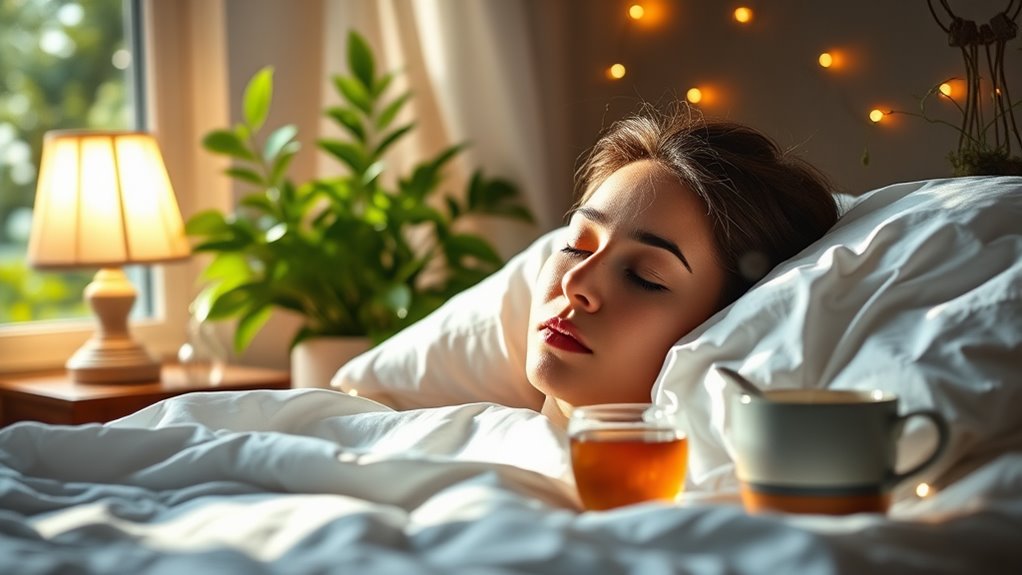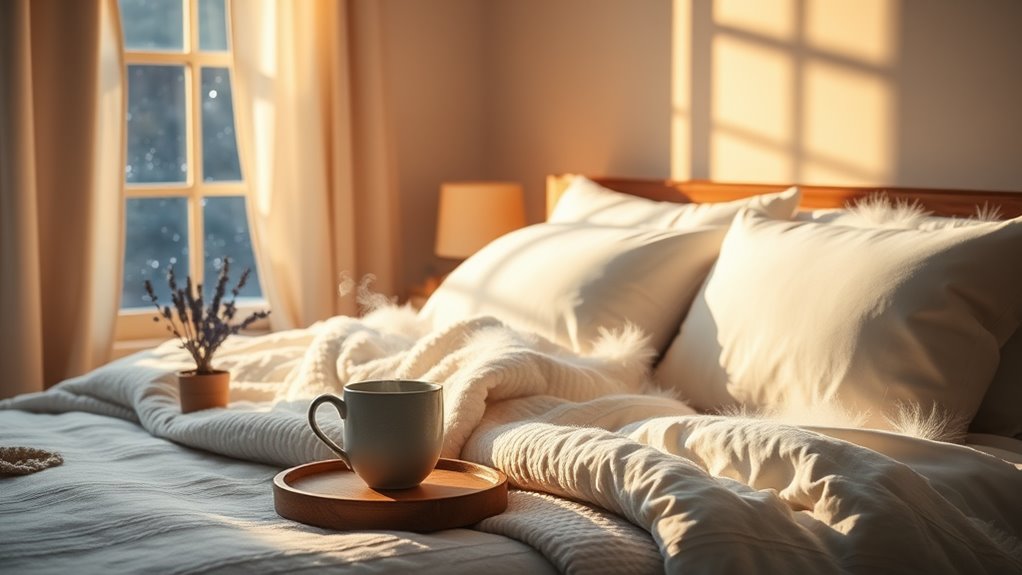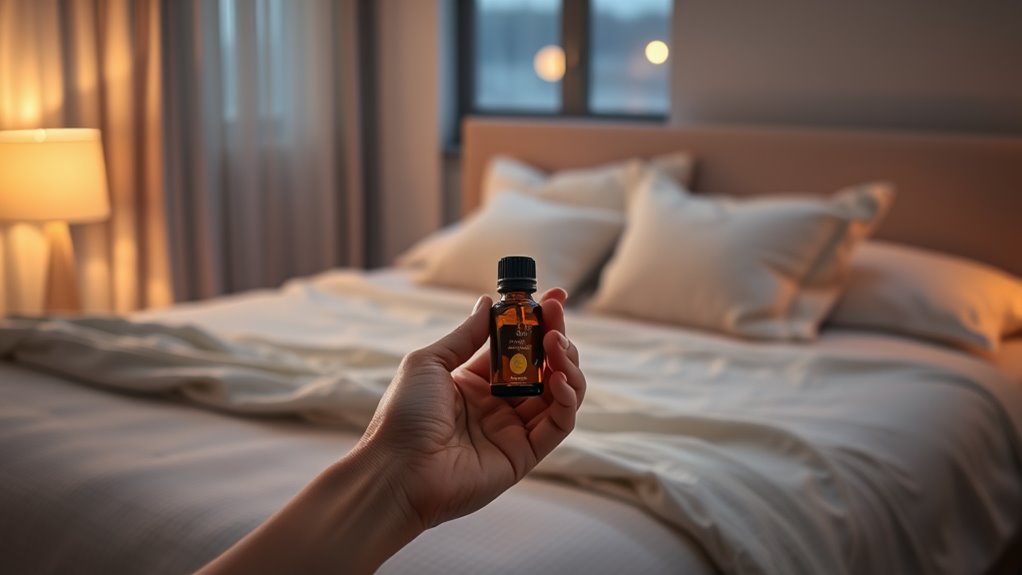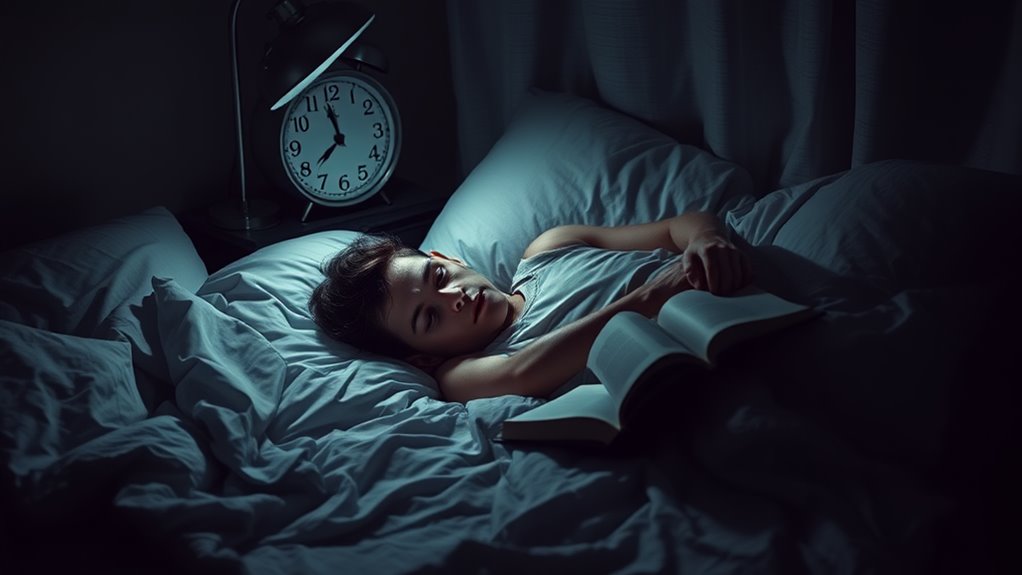My Favorite Herbal Trick for Falling Asleep Faster
If you’ve ever struggled to fall asleep, you might find that a simple herbal trick can make a significant difference. Chamomile tea, with its soothing properties, is a popular choice for those seeking a natural, calming solution. By preparing it properly and incorporating it into your bedtime routine, you might just discover a new ally in your quest for restful nights. But what’s the best way to harness its benefits? Let’s explore further.
Key Takeaways
- Sip a cup of chamomile tea an hour before bed to calm your mind and reduce stress-related sleeplessness.
- Use lavender essential oil in a diffuser to promote relaxation and lower heart rates for improved sleep quality.
- Try valerian root capsules to help unwind and reduce anxiety, enhancing your overall sleep experience.
- Create a sleep sachet with dried passionflower and place it under your pillow for soothing effects that support sleep-wake regulation.
- Combine herbal remedies with magnesium-rich foods for synergistic effects that further promote restful sleep.
The Science Behind Herbal Sleep Aids
Have you ever wondered how herbal sleep aids can effectively help you drift off?
These bedtime herbal remedies often contain compounds that interact with your brain’s neurotransmitters, promoting relaxation and reducing anxiety.
For instance, valerian root enhances gamma-aminobutyric acid (GABA) levels, which calms your mind.
Lavender, known for its soothing aroma, can lower heart rates and improve sleep quality.
Additionally, passionflower may help increase the production of melatonin, the hormone regulating sleep-wake cycles. Furthermore, combining these herbs with magnesium-rich foods can significantly enhance their sleep-promoting effects.
Choosing the Right Herb for Sleep
How do you choose the right herb to enhance your sleep?
Start by considering your specific needs.
If stress keeps you awake, try chamomile for its calming effects.
For those battling anxiety, valerian root may help you unwind.
Lavender, known for its soothing aroma, can promote relaxation and improve sleep quality.
Remember to assess any allergies or interactions with medications.
You’ll also want to consider your preferences—whether you enjoy teas, capsules, or tinctures.
Lastly, don’t hesitate to consult a healthcare professional for personalized advice.
Finding the right herb can transform your nighttime routine into a peaceful ritual. Additionally, understanding bedtime routine optimization can further enhance your sleep experience.
Preparation Methods for Herbal Remedies
When you’re ready to prepare your herbal remedies, understanding the right techniques is key to maximizing their benefits.
Brewing herbal teas allows you to extract soothing properties, while tinctures and extracts offer concentrated forms that can be easily added to your routine. Incorporating natural sleep-inducing techniques into your evening ritual can further enhance relaxation and promote deeper sleep.
Let’s explore these methods to help you relax and fall asleep faster.
Herbal Tea Brewing Techniques
Brewing herbal tea is an art that allows you to unlock the soothing properties of nature’s remedies.
To create the perfect cup, follow these techniques:
- Select Quality Herbs: Choose fresh or dried herbs for the best flavor and benefits.
- Use Appropriate Temperature: Heat water to the right temperature, usually around 200°F (93°C), to extract the full essence.
- Steep Time Matters: Let your tea steep for 5-10 minutes, allowing the flavors to develop fully.
- Enhance with Extras: Consider adding honey, lemon, or spices to tailor your tea to your taste and enhance relaxation.
Enjoy your journey to restful sleep!
Tinctures and Extracts Methods
Tinctures and extracts are powerful herbal preparations that capture the essence of plants, offering a concentrated dose of their therapeutic properties. You can easily make them at home using simple methods. Here’s a quick guide to help you get started:
| Method | Ingredients | Steeping Time |
|---|---|---|
| Alcohol Tincture | Dried herbs, high-proof alcohol | 4-6 weeks |
| Glycerin Extract | Dried herbs, vegetable glycerin | 4-6 weeks |
| Vinegar Extract | Dried herbs, apple cider vinegar | 2-4 weeks |
| Oil Infusion | Fresh herbs, carrier oil | 1-2 weeks |
| Cold Infusion | Fresh herbs, cold water | 8-12 hours |
Choose a method that resonates with you, and enjoy the soothing benefits!
Incorporating Herbs Into Your Bedtime Routine
Incorporating herbs into your bedtime routine can significantly enhance your ability to drift off peacefully.
Consider these simple yet effective ways to integrate them into your evening:
- Herbal tea: Sip on chamomile or valerian root tea an hour before bed.
- Aromatherapy: Use essential oils like lavender in a diffuser or on your pillow.
- Bath soak: Add dried herbs like passionflower or lemon balm to your evening bath for relaxation.
- Sleep sachets: Create sachets filled with soothing herbs and place them under your pillow.
Additionally, combining these herbal practices with techniques for rapid relaxation can help you fall asleep even faster.
Potential Side Effects and Precautions
While herbs can offer a natural remedy for sleeplessness, it’s essential to be aware of potential side effects and precautions. Some herbs might interact with medications or cause allergic reactions. Always consult your healthcare provider before starting any herbal regimen. Here’s a quick reference table to consider:
| Herb | Potential Side Effects |
|---|---|
| Valerian | Drowsiness, headache |
| Chamomile | Allergic reactions, nausea |
| Lavender | Hormonal effects, skin irritation |
| Passionflower | Dizziness, confusion |
Listening to your body is crucial. If you notice any adverse effects, discontinue use and seek professional advice. Additionally, be mindful that some herbal remedies may have misleading marketing claims regarding their effectiveness and safety.
Personal Experiences With Herbal Sleep Aids
Many people have found relief from sleepless nights by turning to herbal sleep aids.
You might discover that these natural remedies not only help you relax but also improve your overall well-being.
Here are some personal experiences that highlight their benefits:
- Chamomile tea eases anxiety, making it easier to drift off.
- Valerian root can enhance sleep quality, leading to more restorative rest.
- Lavender essential oil creates a calming atmosphere for bedtime.
- Passionflower may reduce racing thoughts, helping you unwind.
Additionally, incorporating techniques like the 4-7-8 breathing technique can further enhance the effectiveness of these herbal remedies for achieving restful sleep.




